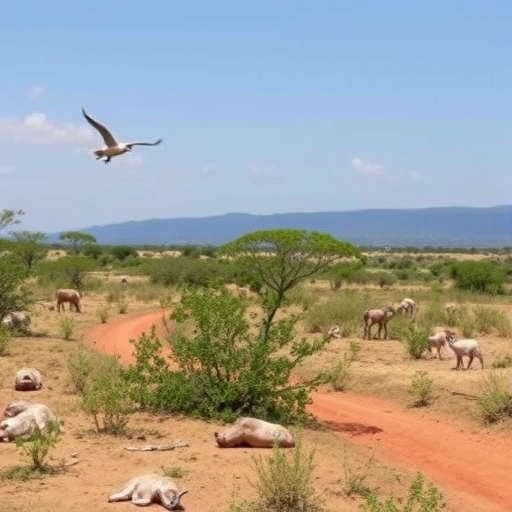The West African sub-region is a complex ecosystem, rich in biodiversity yet vulnerable to various external threats, with wildlife disease surveillance emerging as a pivotal aspect of ecological management and public health. In an insightful study presented by Suu-Ire, R.D., Abugri, H.A., and Abbiw, R.K., the authors meticulously addressed the pressing need for a comprehensive wildlife disease surveillance system in West Africa, focusing on the multifaceted challenges and opportunities within this crucial domain. Such a system is not merely an academic exercise; it bears significant implications for both wildlife health and human populations, considering the intricate links between zoonotic diseases and environmental degradation.
The researchers outlined the overarching aim of wildlife disease surveillance as a way to monitor, prevent, and control diseases that could potentially spill over into human populations. This is especially critical in regions where human-wildlife interactions are increasing due to urban expansion and agricultural development. As wildlife habitats shrink, the risk of zoonotic diseases—which can leap from animals to humans—grows. By understanding and anticipating these risks, governments and health organizations can better allocate resources and implement preventative measures.
The study asserted that the existing framework for wildlife disease surveillance in West Africa is fragmented at best. Historical practices have been marred by limited funding, insufficient expertise, and a lack of coherent policy frameworks. This gap has left regions vulnerable to outbreaks of diseases that could have significant health and economic implications. Furthermore, the authors indicated that ongoing political instability and socioeconomic challenges have compounded these issues, making it even more crucial to bolster surveillance initiatives.
One of the pivotal components highlighted in the study is the importance of employing advanced technologies and methodologies in disease surveillance. The integration of remote sensing, geographic information systems (GIS), and even artificial intelligence can vastly improve the effectiveness of monitoring wildlife health. These technological advancements allow for the collection and analysis of vast amounts of data efficiently, enabling quick responses to potential disease outbreaks.
Moreover, the researchers emphasized the role of local communities in wildlife disease surveillance. Indigenous knowledge and practices can provide valuable insights into the health of wildlife populations. By actively involving local communities and fostering partnerships, the surveillance efforts can be more culturally relevant and widely accepted. These collaborations can help create a shared sense of ownership over wildlife health and foster proactive engagement among community members.
Regional cooperation also emerged as a crucial theme in the study. Wildlife does not recognize political boundaries, meaning that a collaborative regional approach is essential for effective disease surveillance. The authors suggested that countries within the West African sub-region should establish robust networks for sharing information, resources, and findings. Such collaborative endeavors would not only improve the overall health of wildlife but also enhance the resilience of human populations to potential zoonotic threats.
The economic ramifications of wildlife disease surveillance cannot be overstated. The findings in the study revealed that investing in wildlife health can yield significant returns in terms of public health safety and economic stability. Outbreaks of zoonotic diseases can lead to substantial losses in agriculture, tourism, and even national economic productivity. Therefore, the authors argue that preventive measures should be viewed not just as humanitarian acts but as economically sound investments.
Another critical aspect presented in the research concerns the training and education of personnel involved in wildlife health surveillance. The need for skilled veterinarians, biologists, and public health professionals cannot be overstated. Educational programs tailored to the unique challenges faced in the West African context should be developed and implemented. This capacity-building initiative will ensure that there are adequately trained individuals ready to respond to wildlife disease challenges.
As the study progressed, the authors also addressed issues of data collection and management. The reliability of surveillance systems hinges on high-quality data that can be analyzed in real time. To achieve this, the researchers called for standardized protocols in data collection across the region. Establishing a unified set of guidelines will facilitate data sharing and allow for a more comprehensive understanding of wildlife diseases.
Collaboration with global health organizations was another notable point raised in the study. The authors underscored the importance of aligning local surveillance efforts with international health strategies. Global health frameworks, such as the One Health approach, highlight the interconnectedness of human, animal, and environmental health, making cooperation essential for effective disease surveillance.
An equally urgent concern discussed in the research is the increased risk of emerging infectious diseases as a result of climate change. Changes in temperature and precipitation patterns can affect wildlife habitat and behavior, potentially increasing the prevalence of certain diseases. The authors concluded that climate adaptation strategies must be integrated into wildlife disease surveillance programs to address these looming challenges proactively.
Throughout the research, the authors called for a paradigm shift in how wildlife disease surveillance is perceived and implemented in the West African sub-region. By viewing wildlife health as an integral part of public health and economic strategy, there can be greater momentum toward establishing effective surveillance systems. Addressing surveillance as a community effort can help foster resilience and preparedness, ensuring that both humans and wildlife can thrive in a rapidly changing world.
This research presents both a clarion call and a roadmap for action. The alarming reality is that without a coordinated effort, the region risks facing outbreaks that can devastate both human and wildlife populations alike. The current state of wildlife disease surveillance in the West Africa sub-region is a matter of urgency, and the time to act is now.
Subject of Research: Wildlife disease surveillance in West Africa
Article Title: Status of wildlife disease surveillance in the West Africa sub-region
Article References:
Suu-Ire, R.D., Abugri, H.A., Abbiw, R.K. et al. Status of wildlife disease surveillance in the West Africa sub-region.
Discov Anim 2, 48 (2025). https://doi.org/10.1007/s44338-025-00103-9
Image Credits: AI Generated
DOI:
Keywords: Wildlife, Disease Surveillance, West Africa, Zoonotic Diseases, Public Health, Collaboration, Climate Change, Technology.




